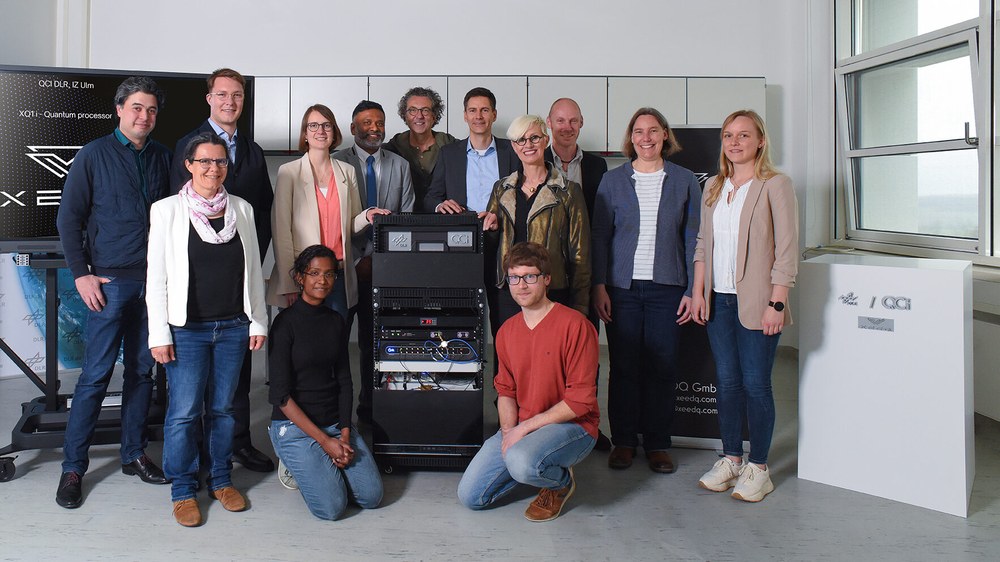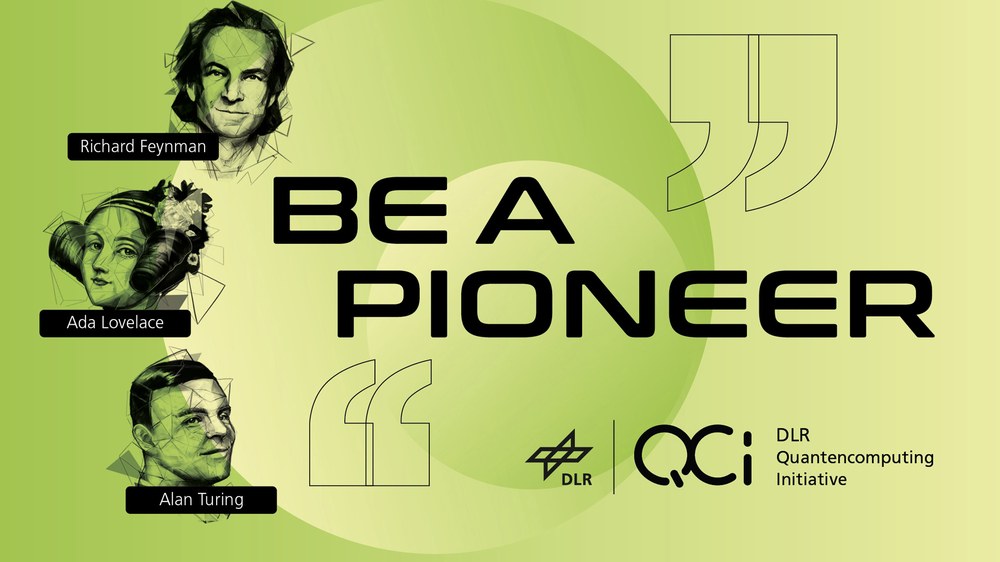„A new compact sensor that will use entangled atoms in microgravity for the first time“
FIELD OF STUDY: Physics | NOW: Institute for Satellite Geodesy and Inertial Sensing
Scientific breakthroughs in quantum technology are opening up new horizons for research, industry and business. With the use of quantum mechanical effects, new types of sensors, simulators, communication networks and computers are becoming possible, with previously unattainable levels of performance.
Quantum technologies are shaping technological progress and thus our future. Components and instruments that make use of quantum behaviour have become an integral part of industry and our daily lives; they are found in transistors in our mobile phones, are used for displays such as LEDs or form the basis of lasers. Modern communication, data transmission and electronics in general would be inconceivable without the utilisation of the quantum behaviour of light, for example. The first quantum revolution has been with us for some time.
Now we are at the beginning of a second quantum revolution. Thanks to intensive research, including at DLR, quantum technologies are at the threshold of becoming applicable in industry and science. In our institutes and facilities, scientists are researching the fundamentals and developing cutting-edge solutions for new types of sensors, computers and networks.
Alexander Fieguth at the Institute of Satellite Geodesy and Inertial Sensing is for example working on the INTENTAS project to improve the sensitivity of atomic interferometers and atomic clocks. The basis for this is the so-called entanglement of atoms – a fundamental concept in quantum mechanics. As part of the project, Alexander and his colleagues are building ‘a new compact sensor’ that will use entangled atoms in microgravity for the first time. The experiments can be carried out with the ‘Einstein elevator’ in near zero gravity with a high repetition rate.
What can be achieved from this? "Already today, atomic clocks in space and on Earth provide highly precise time signals that enable navigation systems such as Galileo. But improved atomic interferometers can also enable extremely precise navigation without satellites," reports the experimental physicist. He goes on to explain that atomic interferometers could also facilitate high-precision measurements of Earth's gravitational field from space: "This can be used to improve climate models or our understanding of the composition of the Earth, among other things."
Mierk Schwabe from the DLR Institute of Atmospheric Physics also wants to use quantum computing and machine learning to improve climate models. "We want to contribute to the development of climate models that enable more accurate regional and local forecasts of the changing climate," explains Mierk.
Doing this requires immense computing power, but one day, quantum computers should be able to. The PhD physicist and her team are researching exactly how this will be achieved in the future with the help of quantum computers at the DLR Quantum Computing Initiative (DLR QCI).
Mierk finds this an exciting field of research and is delighted that she can contribute to a topic as important as climate change and the sustainable development of our modern mobile world. She encourages girls and women in particular to get involved with technical and scientific topics: "We need every creative and motivated mind, especially with the enormous challenges we are facing."


eifertfotodesign.de
DLR places particular emphasis on quantum computing in its research work. Quantum computers can process huge amounts of data in complex calculations or simulations that would take a very long time with current computers – if they can do it at all. Possible applications range from accelerating AI models, materials science simulations and optimisation solutions for logistics and business, to cryptography and cryptanalysis. Research and development work in this area offers enormous opportunities for business, industry and science and has the potential to disrupt entire branches of industry.
In recent years, we have made great progress when it comes to basic research into quantum computing. Now it's time to put these new technological capabilities into practice. To expand our expertise and strengthen the quantum computing ecosystem, we are developing several quantum computers in the DLR Quantum Computing Initiative, with different architectures and the necessary technologies, software and applications together with partners from industry, business and start-ups.
To attain a leading international position in quantum computing, we need a strong quantum computing ecosystem. Only together will research institutes, industry and start-ups overcome major technological challenges and successfully bring quantum computers into use. A flourishing quantum computing environment accelerates technology transfer between industry and research and supports collaboration, innovation and creativity, developing an attractive environment for skilled workers.



We pool infrastructure, expertise and resources at our innovation centres in Hamburg and Ulm. We provide quantum start-ups and industrial consortia with laboratories, workshops and office space and create a highly attractive location with communal areas where groundbreaking progress is possible.
Hamburg, Ulm and Cologne
By addressing and bringing together the entire quantum computing ‘stack’, we are unlocking the full potential of quantum computing, creating sovereign access to computing resources and keeping the value and expertise at every step in Germany and Europe.
Technological diversity is an important principle at the DLR Quantum Computing Initiative. That is why we have commissioned the development of quantum computers and enabling technologies based on ion traps, NV centers (nitrogen-vacancy centers), photons, neutral atoms, solid-state spin and even complementary analogue computers. In addition to contractors, DLR scientists are also developing enabling technologies such as photon sources for photonic quantum computers or special hardware for ion trap quantum computers in research projects.
Markus Mohr from the Institute of Quantum Technologies is working with his colleagues to develop gentle manufacturing processes for diamond surfaces – because defects on diamonds can severely disrupt the underlying quantum bits. "With our research results, we are trying to help ensure that quantum computer hardware based on nitrogen-vacancy centers in diamond can become even faster and more powerful," explains the electrical engineering graduate.
Markus draws great motivation from his varied work in the unique field of quantum computing. He emphasises that there are still many exciting topics to work on: "Theoreticians, experimental physicists, engineers, experts in micro- and nanotechnology are united here so that we can cover everything from the idea to the prototype."
DLR has years of experience in the field of quantum technologies. At our Institute of Quantum Technologies in Ulm and our Institute of Satellite Geodesy and Inertial Sensing in Hanover, we continue researching the latest developments. Both institutes are involved, for example, in BECCAL (the Bose-Einstein Condensate and Cold Atom Laboratory) – a fundamental experiment for quantum sensors on the International Space Station ISS.
Our Galileo Competence Center at the site in Oberpfaffenhofen is working with industry to transfer the research results of quantum technologies to the commercial market for Global Navigation Satellite Systems (GNSS) services.
Other DLR institutes, such as the Institute of Software Technology and the Institute of Communications and Navigation, have been working for many years on software development and application analyses for quantum computers. The topics include post-quantum cryptography, quantum machine learning, planning optimisation for satellite operations and simulation of chemical redox reactions for the development of battery systems. Research projects always have a background in industrial applications.
